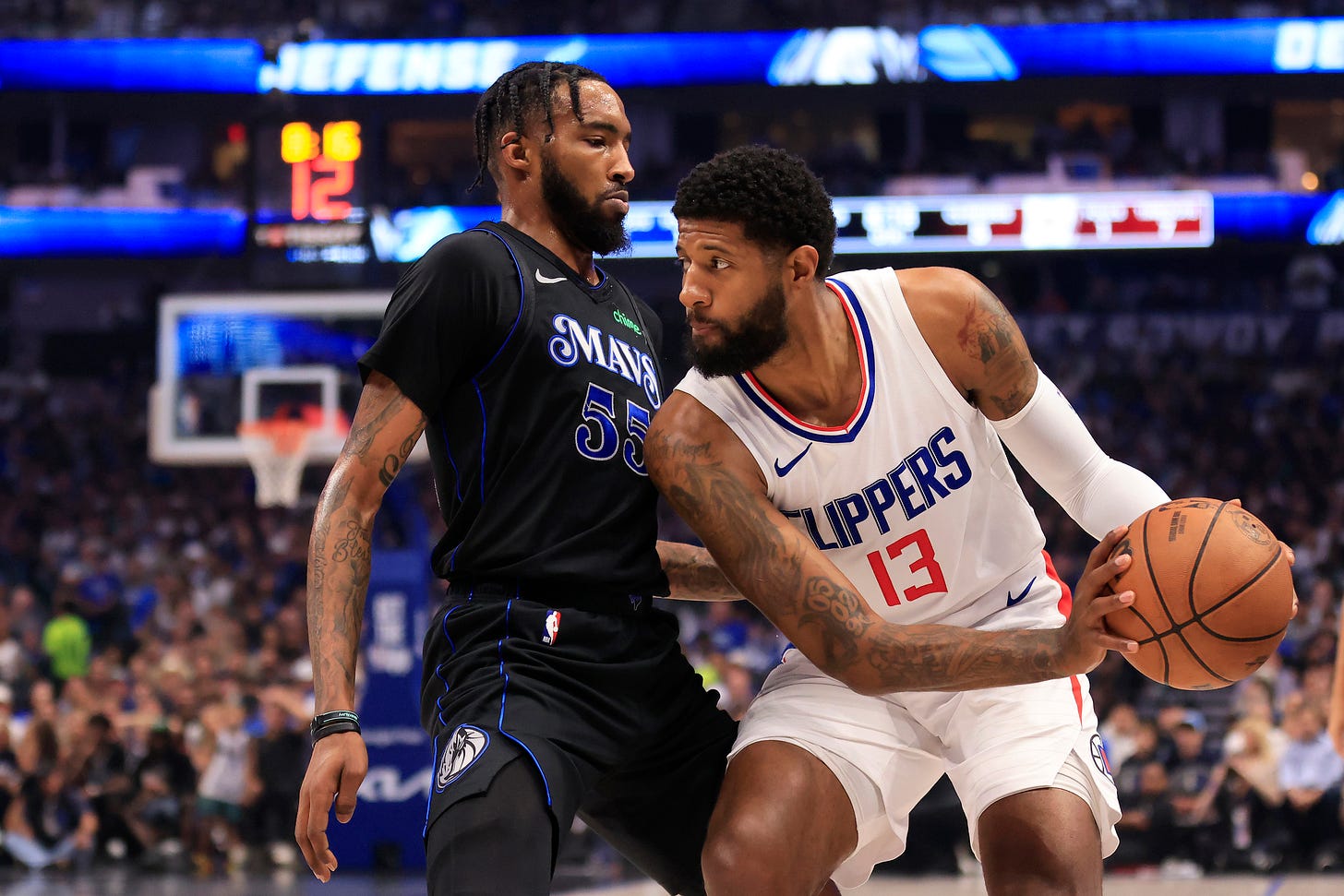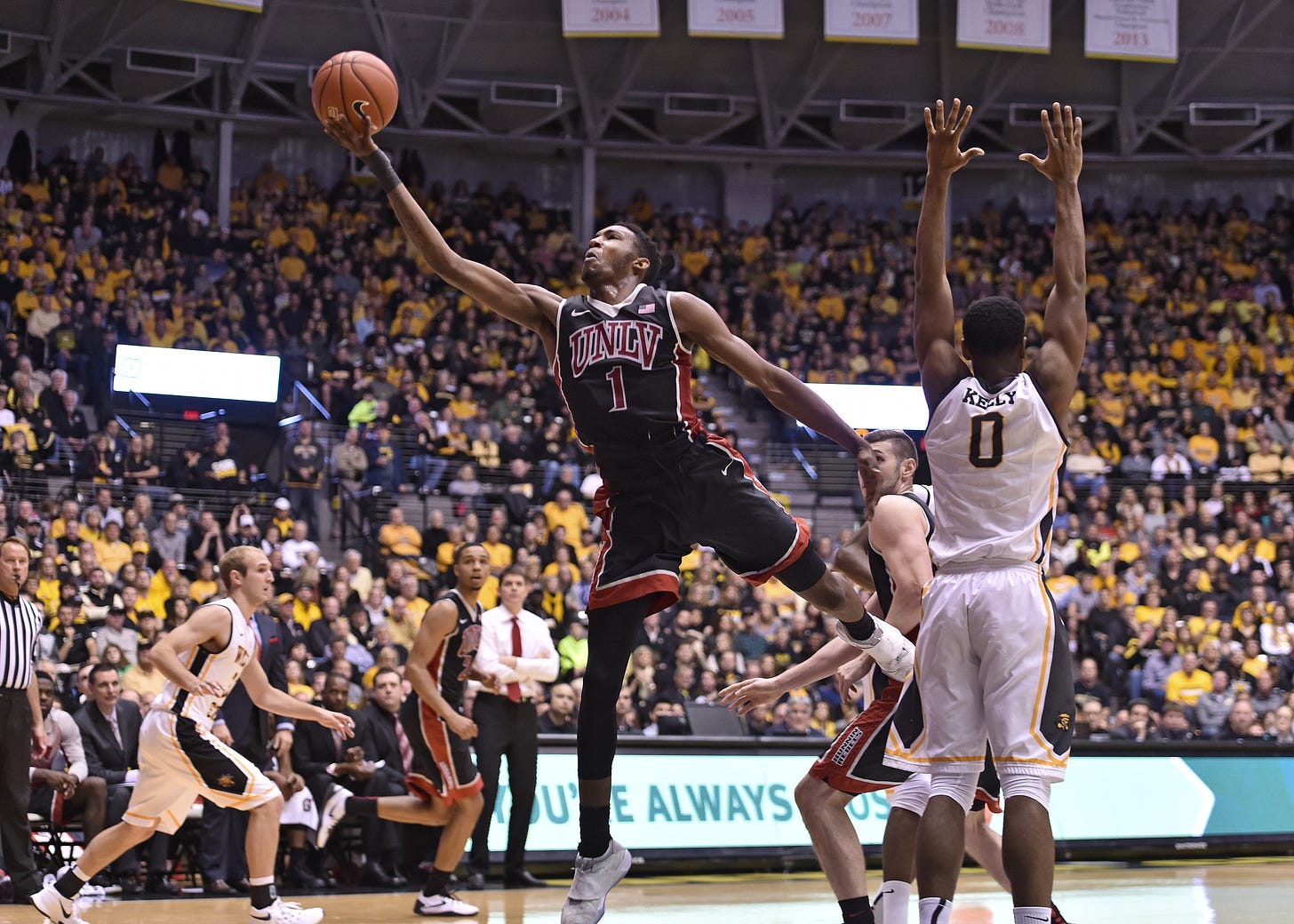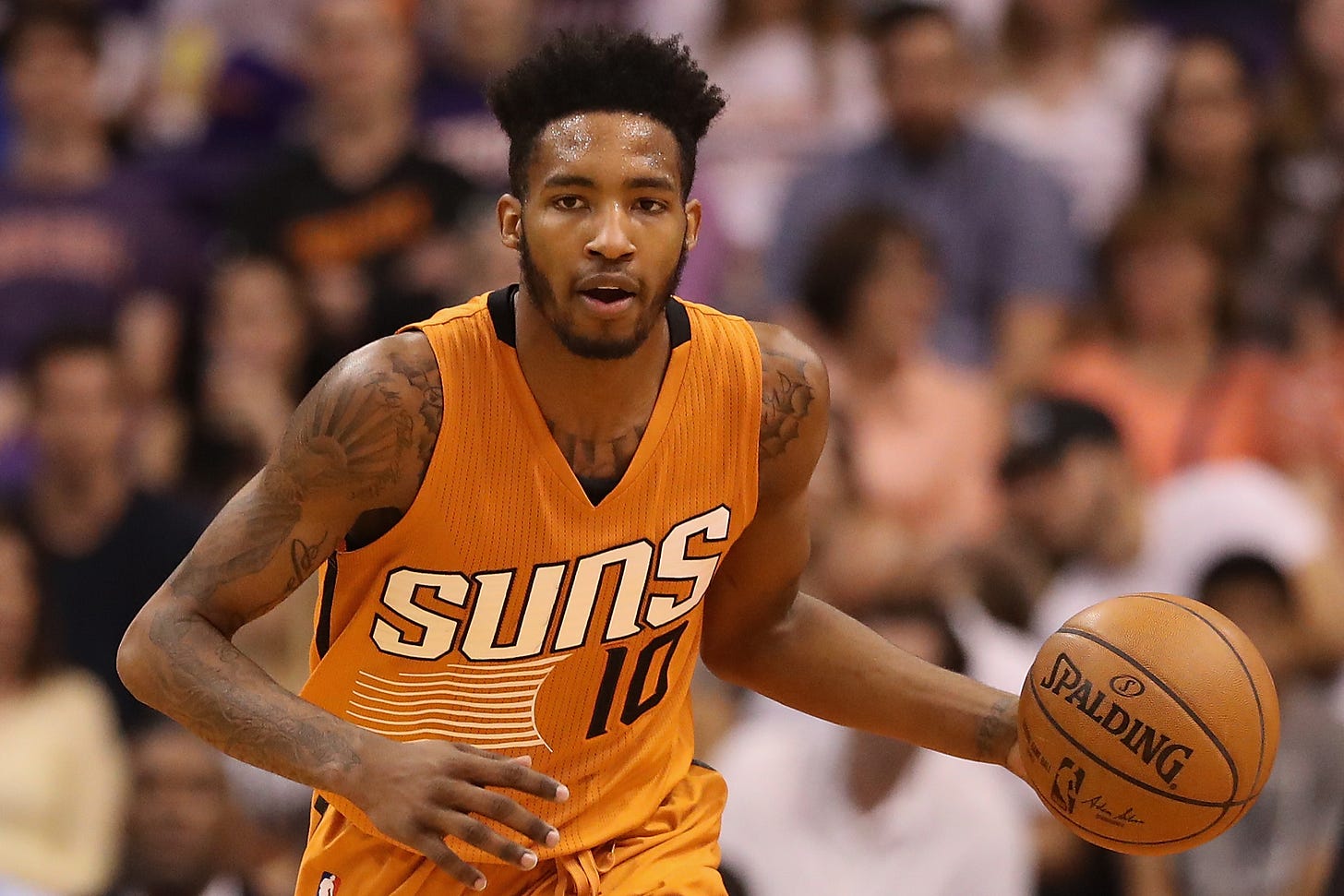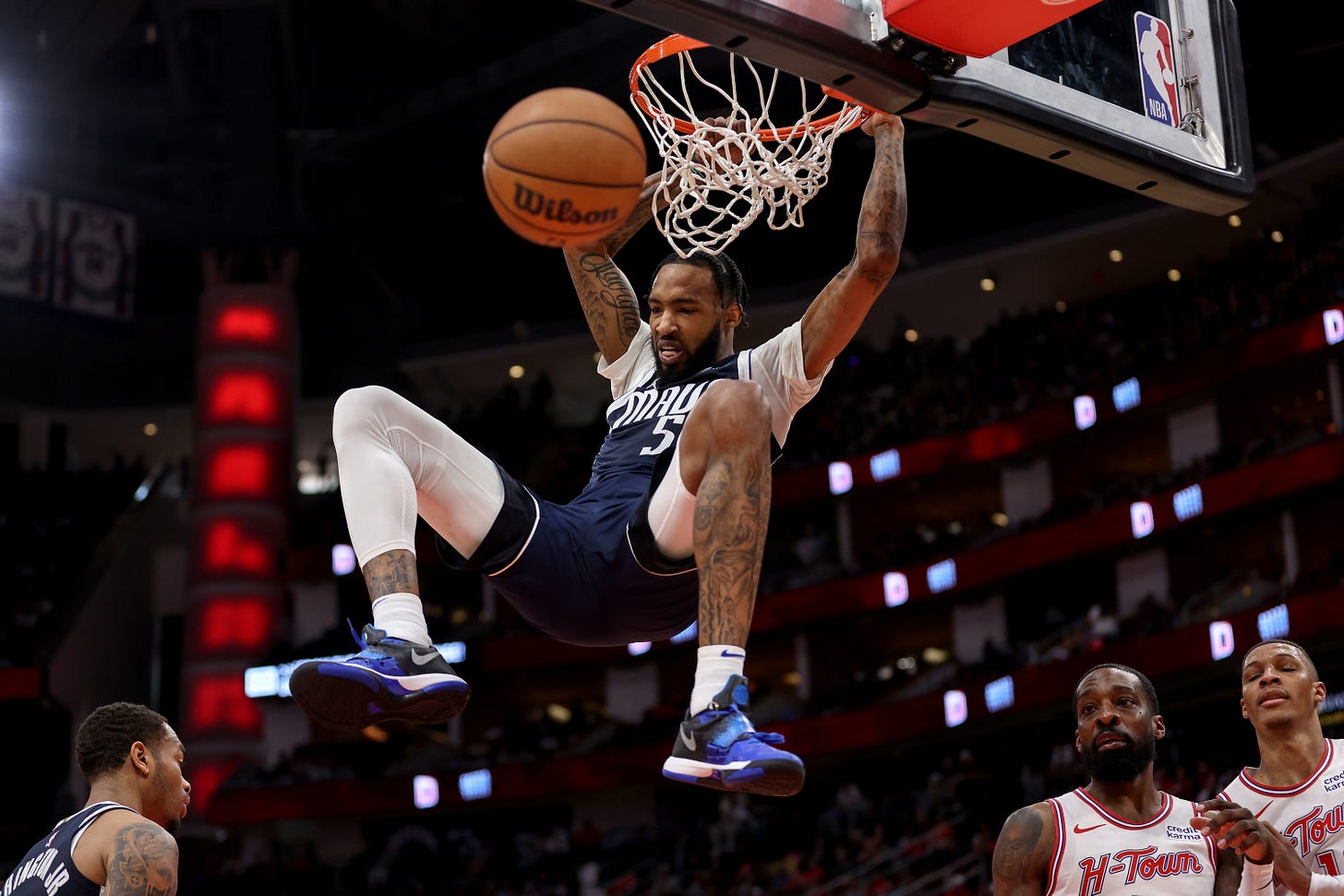Overlooked Potential: Part 2 - Defying Gravity: The Rise of Derrick Jones Jr. from Undrafted to NBA Spotlight
How Derrick Jones Jr. Overcame Early Setbacks to Become a Key Player in the Mavericks' Playoff Success
In part one of this two-part series, I covered how NBA teams missed out on two breakout players from the 2023-24 NBA season, GG Jackson and Derrick Jones Jr., and what we can learn from an evaluation standpoint on future prospects. GG Jackson was a prep phenom whose draft stock tumbled due to poor intel and analytics but found success as a rookie.
Consider joining the NBA governors, general managers, coaches, scouts and players — as well as the draft junkies and casual fans — who enjoy full access to NBA Big Board. Believe me, I get a little thrill from every single subscription.
And if you want to give NBA Big Board an additional boost, please consider providing an amount of your choosing as a Big Board Member.
Each year, I like to revisit previous NBA draft classes to gauge the trajectory of the current class of prospects. It's fascinating to observe which players ascended to All-Star status, which under-the-radar picks surpassed expectations, and which lottery picks flamed out and failed to make their mark before their rookie contracts expired.
I'm convinced that failing in the NBA isn't typically due to a lack of talent. Instead, a variety of factors can derail a player's career, such as injuries, lack of opportunities, poor fit within a team, or a loss of confidence. Additionally, some young players struggle with becoming "lost in the sauce"— basically a way of saying they get overwhelmed by the fast-paced lifestyle, wealth, and temptations that come with newfound fame.
When revisiting the 2016 NBA Draft, Derrick Jones Jr.'s absence from the list of draftees is glaring, especially given his current impact.
Despite being undrafted in 2016, Jones has become a critical player in the Dallas Mavericks run to the conference finals, highlighting the unpredictable nature of player development and the draft's hidden gems.
Jones playoff success has been a revelation for the Mavs, and potentially a costly one, as he will be a free agent on July 1st and is due for a significant raise from his current 1-year minimum salary.
Jones has established himself as one of the best wing defenders in the NBA, often guarding the opposition's top perimeter offensive option. In the first round of the playoffs, he was assigned to James Harden and Paul George, followed by a matchup with Shai Gilgeous-Alexander in the semifinals. Now, in the Western Conference Finals, he's matched up against Anthony Edwards.
Jones has also ignited the Mavericks' offense, averaging 12.8 points on 47/37/81 shooting splits in the second round against the Oklahoma City Thunder. In the final three games of the series, Jones averaged 19.3 points, shooting a sizzling 64% from the floor and 50% from beyond the arc. His performance showcased his offensive impact as a slasher, shooter, and highlight-reel finisher above the rim.
Reflecting on the 2016 NBA Draft, it's puzzling to consider how an uber-athletic 6’6” wing with a 7-foot wingspan and a 46-inch vertical leap could go undrafted, especially when 5 of the 14 lottery picks and 16 of the 30 first-round picks are no longer in the league.
When you consider that similar physical attributes are typically valued highly on draft boards, Jones' journey highlights the puzzling nature of the NBA draft process.
Undrafted
Derrick Jones Jr. had a solid freshman campaign at UNLV, where he was the team's second-leading scorer, averaging 11.5 points on 58.9 percent shooting and 4.5 rebounds in 30 games. His length, athleticism, and defensive upside made him an appealing prospect. However, his game was primarily limited to scoring in transition, cuts, hustle plays, and offensive rebound putbacks.
His thin frame, coupled with concerns about his shooting mechanics, ball handling, and overall feel for the game, ultimately outweighed his potential in the eyes of many scouts. These perceived flaws led to him going undrafted, despite his outlier athleticism and defensive promise.
Jones on going undrafted:
I guess it was the upside that they saw in everybody else that was drafted before me. I’m the type of person to bet on myself. I really didn’t care how other people felt. I bet on myself and trusted my work.
Aaron Turner, Jones' agent and the President of Basketball at Verus Basketball:
His body wasn't nearly ready, so he went undrafted. He came to Cleveland and stayed with me for a month, and we just worked on his body. We were trying to get him ready to make a team. He would eat crazy meals and put on about 12 pounds.
Opportunity
Jones signed with the Sacramento Kings for the 2016 NBA Summer League, hoping to earn a training camp invite. However, a health scare prevented him from playing for the Kings' summer league squad, adding an extra layer of disappointment at the start of his professional career.
In September 2016, Jones was one of three players the Phoenix Suns signed to training camp deals. It was an uphill battle to make the Suns' opening night roster, as the team entered training camp with 14 players already signed to guaranteed contracts.
Jones secured an opening-night roster spot, impressing the Suns during training camp and preseason, and ultimately beating out former first-round pick Archie Goodwin.
However, Jones spent the bulk of his rookie season in the D-League, now known as the G-League, with the Northern Arizona Suns. There, he played under Coach Ty Ellis, the founder of The Ellis Performance Group, motivational speaker, and Optimal Performance coach.
Speaking on Jones' time in the D-League, Northern Arizona coach Ty Ellis said in a 2017 interview:
Derrick did have a great attitude about being in the D-League. And it’s very uncommon, unfortunately. These young kids, or young men, they assume the D-League is a demotion. And it’s not. The D-League is a perfect opportunity for you to grow and also stake your claim that you belong in the NBA.
Recently, Ellis reflected on his first time hearing about Derrick Jones Jr.
When he first got there, my boss, Bubba Burge, told me that Jones had a lot of potential. He mentioned he's gone under the radar but could turn out to be a really good NBA player. So I started asking questions. He said, 'Ty, just type in his name. Just type in his name in Google and give me a call back.' So I typed in his name and obviously saw he was a freakish athlete with perfect NBA length and size.
So I called him back super excited about Jones joining the Suns. That was during a difficult time for the organization, and they didn't have room for him. They didn't really see the potential. I knew that he was going to spend a lot of time with me, and I was super excited for obvious reasons. I got to coach this freak athlete, and he's a lefty. I just have a thing for lefties and I loved the way he played. So I was super excited.
Development and Breakthrough
Jones' coachability and strong work ethic were evident as he diligently followed the strategic development plan laid out for him by Ellis and the Phoenix and Northern Arizona Suns staff, consistently working to improve his skills and maximize his potential.
Ellis recalled:
I remember telling him a story about going on a blind date. If you go on a blind date, the first thing they say is, 'She has a great personality.' And then you say, 'Well, how does she look?' 'Oh man, she has a great personality.' Okay, okay. But, like, tell me something physical about her. 'She has a great personality.' And I equated that to him being an athlete. At this level, 98-99% of the guys on the court are athletes. You don't want to be known just as an athlete, because you're only going to dunk the ball so many times in a game, you know, but what else?
Adds Ellis:
The way we did player development was we identified and assessed every player. We assessed their strengths and made their strengths stronger. And we developed their weaknesses, and everybody was different. So, we had a very detailed plan on what Derrick was going to work on for the first three months. Everything was purposeful with his development. Our plan was to develop him so he could help the Suns compete and win, and for him to become a full-time NBA player.
Jones' commitment to his development was also reflected in the strategies implemented by his agent, Aaron Turner.
I think the biggest thing, and why his dad really liked me for DJ (as his agent), is that I saw the build-out. I saw the talent and what needed refining, but I still didn't put him in a box. Every off-season, we would push the envelope, working on him as a pick-and-roll ball handler, attacking closeouts, and shooting threes—a ton of them. In the last few summers, he did a couple of ‘100 Shot Drills’ every day, making sure he would get into the high 70s.
The 100 Shot Drill is a widely used shooting and conditioning exercise that NBA front office personnel employ to evaluate prospects during pre-draft workouts. The drill involves 100 consecutive three-point field goal attempts from various locations on the court. Trainers often adjust the drill based on the player's position and the typical spots they would shoot from within an offensive scheme.
With my training background, I loved using the 100 Shooting Drill as a barometer to measure a player's shooting percentage on catch-and-shoot three-pointers. I tracked the player's shots over the summer to get an average number of makes per 100 shots. Once I had the average, I divided it in half and set a goal for the player to shoot that percentage for the upcoming season. For example, if a player averaged making 70 out of 100 shots, I expected him to shoot around 35% from three during the season.
Turner adds:
He would progress every summer. And especially last summer, we really spent a lot of time on it to get that to where it is. And we wouldn't just come in and shoot. It would be, like, okay, 100 shot drill. Where are we at the start? Where are we at the finish? He was a guy that started in the mid-60s two years ago, finishing now in 77, 78, 79 out of 100. Sometimes in the 80s.
You've got to get to that point where open standstill threes are automatic. In games, once all the speed of the game, the variables, and not having the rhythm of shooting 8, 10 in a row, you're going to shoot half of that or maybe, like, even 45% of that.
Transitioning to the present, Turner explained the importance of constantly pushing the envelope while monitoring Jones' efficiency:
It's been a combination of pushing the envelope and just monitoring his efficiency while we're doing that. All this stuff he's doing now—attacking closeouts, short rolling, all that good stuff, the cutting—but it was still super important that he became a solid three-point shooter. If he was a 28, 29% three-point shooter, all that other stuff wouldn't matter.
Turner continues:
All the work's kind of coming out now because he really hasn't been in a situation where he could show all he could do. He's comfortable bringing it out now. And you're seeing it as he's gotten more comfortable this year, it's coming out more and more.
Pivotal Role with the Mavericks
With Jones' athleticism and length, he's played a key role in helping to establish the Mavericks' defensive identity. His ability to apply ball pressure against top offensive options, combined with his knack for using his athleticism and length to recover and provide weak-side rim protection, has been crucial to the Mavs' playoff success.
Additionally, Jones' energy, rim-running, and outside shooting have been significant boosts for Dallas, which is now just three wins away from the NBA Finals.
Jones' defensive performance has been so impressive that there was considerable online chatter, especially from Mavs fans, that he should have been strongly considered for the NBA All-Defensive Team. Unfortunately, Jones was ineligible for the award. Despite appearing in 76 games and averaging 23.5 minutes per game, the NBA's player participation rules for awards require a player to play 62 or more games while logging at least 20 minutes in each. Jones met this mark in only 48 games, making him ineligible for consideration.
Despite this minor setback, Jones' journey with the Mavericks is a testament to his resilience and determination. He was a late addition to the Dallas Mavericks, not signing his contract until over a month after free agency started.
He accepted a one-year league minimum deal worth about $2 million. Jones bet on himself, leaving money on the table by opting out of the second year of his two-year, $6.6 million contract with the Chicago Bulls. And the gamble has paid off—big time.
The 27-year-old veteran set career highs in minutes, points, made 3s, and 3-point percentage in the regular season and will have a long list of suitors ready to offer a significant pay raise for his services next season.
Not bad for a raw, athletic wing who was once considered too light to play in the NBA but was willing to do whatever it took to get on the floor, including playing as a small-ball center in Chicago.
Reflecting on his early career, Jones recalls:
Coming into the draft I was like 175 pounds. We got a 7-footer (Dereck Lively) who’s light at 218, and his game is amazing. I'm not comparing me and him. But size really doesn’t matter. Weight don't matter. For me, it's just the heart that you have and the effort you put out there. I played the three, four. I played five, which is kind of weird. I've never played five in a league before. But I learned how to guard the post a lot more, a lot better.
While 58 players will fulfill their lifelong dream of hearing their name called during the 2024 NBA Draft next month, there will be a number of players who will have to fight, scratch, and claw their way to an NBA roster as undrafted free agents, joining the likes of Jones, Dorian Finney-Smith, Austin Reaves, Alex Caruso, Christian Wood, Fred Van Vleet, Luguentz Dort, T.J. McConnell, and 2024 NBA Sixth Man of the Year Naz Reid.
When asked what he would say to a prospect whose name isn’t called on draft night and will have to make the journey to an NBA roster as an undrafted free agent, Jones replied:
Probably the same thing that I said to myself on draft night. Stay focused. Don't worry about the doubters. Keep your head on straight. Go work. That's all you can do. Lock yourself in the gym and work. Whatever you feel like your flaws are, work on that. Make sure that you're better at it. And when you go out there and you get your opportunity, make the most of it.






Nice Article Spot on!!